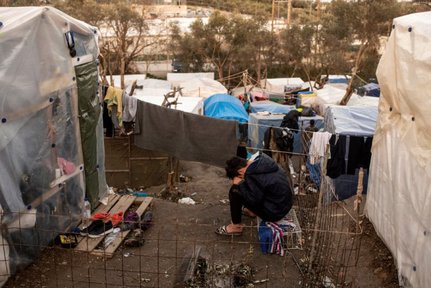On solidarity and refugees – Katrin Elger, Florian Gathmann, Martin Knobbe, Timo Lehmann, Veit Medick, Peter Müller, Lydia Rosenfelder, Christian Teevs und Wolf Wiedmann-Schmidt in Der Spiegel:
‘It is always the same situation when the refugee issue comes up. On Lesbos, a refugee camp goes up in flames and most European heads of government cross their arms and look away. It is a further demonstration of "the entire wretchedness of European asylum policy," the German chancellor griped on Tuesday. Everyone knew, she went on, about the "indefensible conditions" in the camps. But nothing, she said, is more difficult in the European Union than the question as to how refugees should be distributed. Even finance negotiations, she complained, are child's play by comparison.’
(…)
‘Merkel, who has seen her popularity skyrocket from an already high level in recent months, suddenly finds herself in a bind - on both domestic and foreign policy. The drama on Lesbos, the suffering of thousands of people who are suddenly living on the streets without a roof over their heads following the fire, has suddenly rekindled a situation that had recently faded into the background. And now, once again, Germany and Merkel's coalition government with the Social Democrats (SPD) is quarrelling about whether to show compassion or obstinance. Conservatives are worried about putting wind in the sails of the populists while the SPD sees an opportunity to divide the conservatives and pose as moral guardians.’
(…)
‘Surprisingly, that led even Seehofer to support the idea of taking in a larger number of refugees, particularly because even the Greeks were in favor of the idea. Previously, Athens had been concerned that the mass transfer of asylum-seekers from the Greek islands to other EU countries could be seen as a reward for the arsonists. But the Greek government had nothing against the transfer of pre-approved families that didn't just come from the island of Lesbos.
At 7 p.m., Seehofer headed over to the Chancellery with the idea, and Merkel was immediately convinced. The next morning, the minister informed conservative lawmakers, and news of the plan was leaked to journalists, which infuriated Scholz. But after a telephone discussion between Merkel, Seehofer and Scholz, tempers were calmed and the plan was put to paper. The SPD added a sentence and then, at 5 p.m., Scholz sent a text message: "We agree."
Merkel is lucky that Seehofer didn't stand in the way as he has so often on the issue in the past. During the 2015 refugee crisis, he accused her on more than one occasion of having broken the law. This time around, though, he stood at her side.
More than that, Seehofer is also extremely frustrated about the unwillingness of Germany's EU partners to accept refugees from Greece. On the sidelines of a recent meeting in parliament, he listed all those who have, from his point of view, left Germany in the lurch. And it's pretty much everybody.’
(…)
‘Still, it is clear what will happen to the 1,553 people that Germany has accepted: They have already been granted asylum status and can now begin establishing their new lives. Following their arrival, they will be distributed among different German states, where they are to be integrated and hopefully find work.
By comparison, the situation for those who remain in Greece is much worse. Even those who have received asylum status, laments the human rights organization Pro Asyl, face an extremely uncertain future.
Merkel, Seehofer and Scholz have made things rather easy on themselves by only accepting those refugees who have already been granted asylum status. But pressure on the chancellor to take even more of those who are suffering on the Greek islands is growing.
With many European countries refusing to help, some German states are insisting that they be allowed to help on their own. Both Thuringia and Berlin would each like to accept several hundred refugees from the islands.
Financing such an effort would not be problematic, say officials in Thuringia. "As a state, we would assign the people to the municipalities and then cover the costs," says Thuringia Migration Minister Dirk Adams, a member of the Green Party. But, he adds, he doesn't believe that the price tag will be the decisive factor.’
Read the complete article.
‘Even finance negotiations, she complained, are child's play by comparison.’
That the question how to distribute refugees in Europe has become the most divisive factor in the EU is a clear success for the far-right parties and the far-right governments.
The fact that Seehofer’s CSU stopped trying to copy the AfD and recognized that copying the AfD was a losing and also immoral strategy should give parties and politicians in other countries food for thought.
The EU let camps as in Moria fester for months or even years and that is painful. Especially because many in Europe still believe they are sitting firmly on their moral high horse compared to let’s say the US. Well, not that firmly.
But the comeback of Merkel, after she was declared a lame duck, should provide us at least with some sliver of optimism.
